|
|
|
Sort Order |
|
|
|
Items / Page
|
|
|
|
|
|
|
| Srl | Item |
| 1 |
ID:
107192
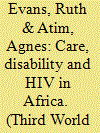

|
|
|
|
|
| Publication |
2011.
|
| Summary/Abstract |
Recent research and policy have recognised the central role of unpaid care-givers (often women and girls) in the global South. Disability rights perspectives, however, challenge the language of 'care' and 'dependence'. Drawing on qualitative research with women living with HIV and children caring for them in Tanzania, and on learning from the National Community of Women Living with HIV and AIDS in Uganda (NACWOLA), this paper explores the divergences and interconnections between the concepts and practices of care, disability and HIV in the context of East Africa. Despite the development of interdependent caring relations, both care-givers and people living with HIV in Tanzania experience 'diminished autonomy'. The participation of people living with HIV, including disabled people, in home-based care and in peer support groups, however, can enhance 'relational autonomy' for both care-givers and care-recipients. We reflect on opportunities and challenges for mutual learning and cross-movement advocacy by disabled people, people living with HIV and care-givers.
|
|
|
|
|
|
|
|
|
|
|
|
|
|
|
|
| 2 |
ID:
107197
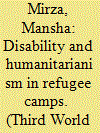

|
|
|
|
|
| Publication |
2011.
|
| Summary/Abstract |
There are an estimated 43.3 million forcibly displaced people around the world, many of whom live in refugee or internally displaced camps. These camps are disproportionately congregated in the developing world, making them a prevalent, yet often overlooked landscape in the global South. Among the scores of refugees living in refugee camps is a large number of people with disabilities. This article provides an overview of humanitarian practices and their guiding philosophies and how these address disability issues within the context of refugee camps. Examples of grassroots initiatives related to disability rights and disability inclusion within refugee camp settings are also provided. Using these examples, the paper makes the argument that refugee camps offer fertile grounds for the diffusion of a community-engaged, grassroots disability praxis across the humanitarian field and beyond.
|
|
|
|
|
|
|
|
|
|
|
|
|
|
|
|
| 3 |
ID:
107195
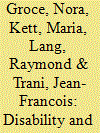

|
|
|
|
|
| Publication |
2011.
|
| Summary/Abstract |
The international development community is beginning to recognise that people with disabilities constitute among the poorest and most vulnerable of all groups, and thus must be a core issue in development policies and programmes. Yet the relationship between disability and poverty remains ill-defined and under-researched, with few studies providing robust and verifiable data that examine the intricacies of this relationship. A second, linked issue is the need for-and current lack of-criteria to assess whether and how disability-specific and disability 'mainstreamed' or 'inclusive' programmes work in combating the exclusion, marginalisation and poverty of people with disabilities. This article reviews existing knowledge and theory regarding the disability-poverty nexus. Using both established theoretical constructs and field-based data, it attempts to identify what knowledge gaps exist and need to be addressed with future research.
|
|
|
|
|
|
|
|
|
|
|
|
|
|
|
|
| 4 |
ID:
107189


|
|
|
|
|
| Publication |
2011.
|
| Summary/Abstract |
In this article, drawing on in-depth multi-sited ethnographic field research, a description is given of how an 'amputee and war-wounded' community formed in Sierra Leone after a 10-year civil war from 1991 to 2002. Through the shared experiences of life in a camp, medical care, participation in the rebuilding of the nation-state, to the 'managing' of the everyday structural violence of poverty, people find themselves dealing with new local and global spaces created in a post-conflict environment. The way that people understand how to negotiate these new spaces is gendered, embodied and also spiritual. The article thus argues that social recognition in terms of reparations or reintegration has to take into account these understandings. Interventions have to be material, spiritual (visible and invisible) and embodied (true inclusion) to have an impact in reintegrating people who become amputees or are wounded during a conflict.
|
|
|
|
|
|
|
|
|
|
|
|
|
|
|
|
| 5 |
ID:
107190
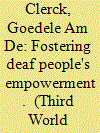

|
|
|
|
|
| Publication |
2011.
|
| Summary/Abstract |
From its beginnings deaf studies has acknowledged that deaf people have their own ways of learning, knowing and viewing the world. A recently emergent culturally sensitive line aims to document indigenous sign languages and deaf cultural patterns in non-Western contexts. Employing the concept of deaf (indigenous) epistemologies as an analytical tool enhances insight into the diverse lives and experiences of deaf people both as individuals and as members of a community. This concept is explored through its application to a case study of emancipation processes in the deaf community in Cameroon. The challenges of an ongoing research process, a participatory and community-based approach, and the valuing of deaf indigenous knowledge in research are presented. These challenges also included negotiation of research findings and exposure of the Cameroonian deaf community to deaf indigenous knowledge on a broader scale in a way that fostered the community's empowerment and ownership of the present study.
|
|
|
|
|
|
|
|
|
|
|
|
|
|
|
|
| 6 |
ID:
107193


|
|
|
|
|
| Publication |
2011.
|
| Summary/Abstract |
Disability is a representational system and its denotation is a result of how communities make sense of and mark corporeal differences. In this paper I argue that the UN norm standard setting, a form of geodisability knowledge, determines the kinds of bodies known as disabled and acts as a technology of disability governmentality. The institutional strategic gaze, sited in the UN, examines, normalises and conditions nation-states. Without consensual international disability norms it would not be possible to disclose and make visible the dynamics of disability at a country level and for the World Health Organisation (WHO) to map disability globally. An alternate reading of international norms is to figure the functioning of geodisability knowledge to naturalise it through codifying hegemonic ways of seeing, citing and situating disability and thus colonise different cultural approaches to disability. A discussion of geodisability knowledge production is pursued within the context of a Sri Lankan case study.
|
|
|
|
|
|
|
|
|
|
|
|
|
|
|
|
| 7 |
ID:
107188
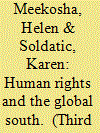

|
|
|
|
|
| Publication |
2011.
|
| Summary/Abstract |
This article seeks to examine the politics of human rights and disability in light of the recent United Nations Convention on the Rights of People with Disabilities (UNCRPD), which has been central to the struggle for recognition of disabled people. Northern discourses of disability rights have strongly influenced the UNCRPD. We argue that many of the everyday experiences of disabled people in the global South lie outside the reach of human rights instruments. So we ask what, if anything, can these instruments contribute to the struggle for disability justice in the South? While Northern discourses promote an examination of disabled bodies in social dynamics, we argue that the politics of impairment in the global South must understand social dynamics in bodies.
|
|
|
|
|
|
|
|
|
|
|
|
|
|
|
|
| 8 |
ID:
107196


|
|
|
|
|
| Publication |
2011.
|
| Summary/Abstract |
Bushenyi District Education Department in Uganda, east Africa, is supporting 123 deaf children registered in 14 units attached to primary schools-eight per cent of deaf children in Bushenyi. Yet fewer than two per cent of deaf children attend school in Uganda as a whole. The history of this ground-breaking, parent-led, yet government-funded, community-based initiative is explored in the light of global efforts to promote Education for All. It is argued that government commitment to teacher education, parent involvement and Sign Language development has led to more positive attitudes towards deaf children and their right to attend school in their communities. Furthermore, community involvement is essential in achieving quality education for all for deaf and disabled children, and attempts to implement Northern policies and practices on inclusive education are likely to fail. The imaginative use of community-based human resources can lead to more genuine forms of educational inclusion.
|
|
|
|
|
|
|
|
|
|
|
|
|
|
|
|
| 9 |
ID:
107194


|
|
|
|
|
| Publication |
2011.
|
| Summary/Abstract |
The experience of disability in the global South remains relatively underreported in spite of the greater focus on disability as both an impediment to development and frequently as a result of development. This article reports a qualitative study using ethnographic techniques undertaken in the province of Khon Kaen in Northeast Thailand. The primary participants were men who had experienced a severe spinal cord injury at a time when they were breadwinners, a role which is significant in the context of a modernising state that is an active participant in a global economy. The experiences, constructions and beliefs of these men, their family carers, and other informants illustrate the complex ways in which social and cultural factors interact with the opportunities, challenges and constraints of the transition modernity. The findings, interpreted according to the 'three bodies' approach, illustrate the intersection of colonising effects, governmentality and resistance, and embodied experience in a cultural context.
|
|
|
|
|
|
|
|
|
|
|
|
|
|
|
|
| 10 |
ID:
107198
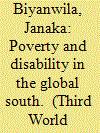

|
|
|
|
|
|
|
|